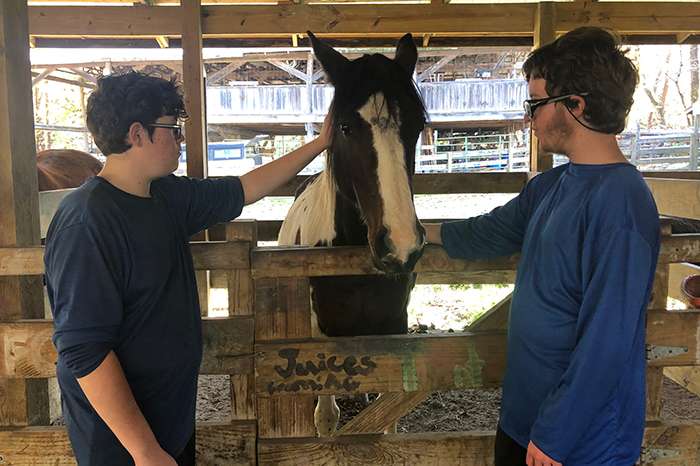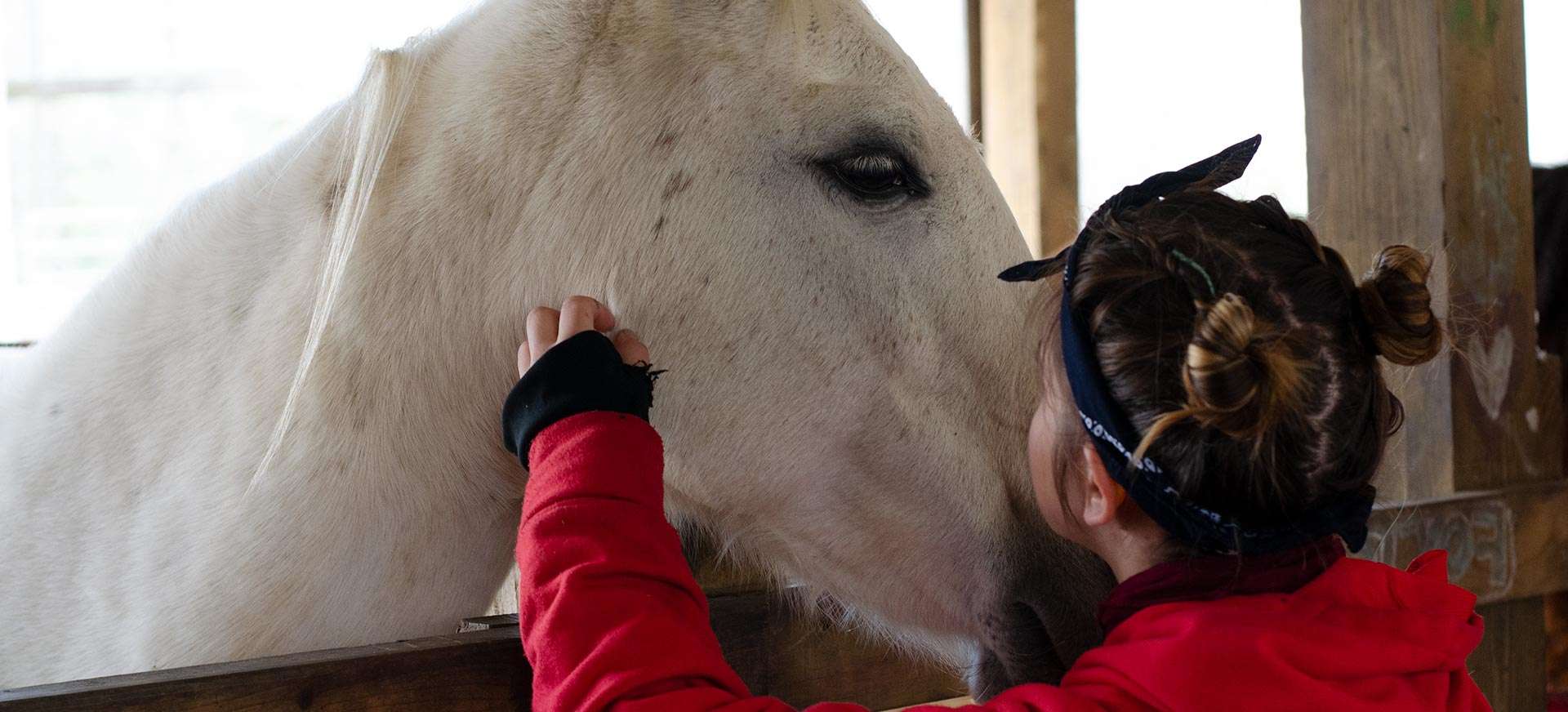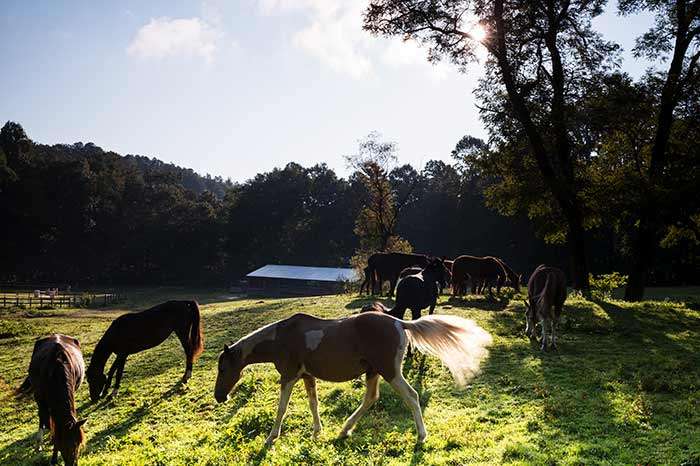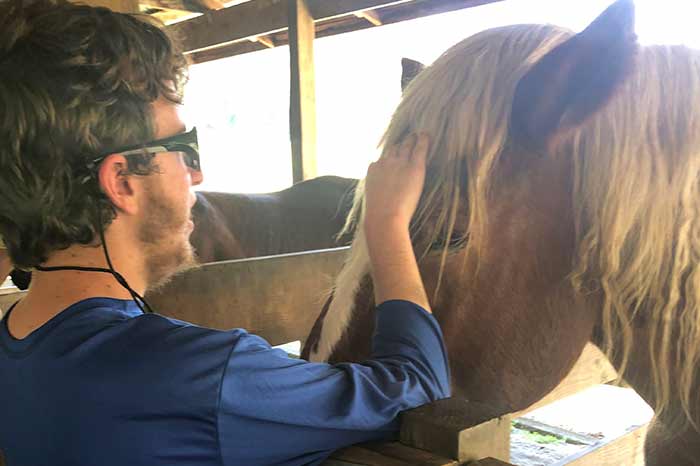What is equine therapy?
Equine therapy, also called equine-assisted therapy, therapeutic horsemanship, or horse therapy, is one of the many evidence-based, experiential therapies we embrace at Trails Carolina.
This therapeutic approach to mental health and behavioral treatment is often used as a complementary approach to traditional therapy methods such as individual psychotherapy, group and family therapy.
Typically, it involves the use of therapy horses to facilitate learning and promote emotional, cognitive, physical, and social well-being. In equine therapy programs, equine-assisted learning often takes place through various activities and interactions between the participants and therapy horses under the guidance of trained equine interaction professionals.

Equine Relational Programming at Trails Carolina
At Trails Carolina, equine therapy and therapeutic horsemanship play an important role in our wilderness therapy programs. While at our residential base camp, our pre-teen and teen students have the opportunity to participate in equine therapy sessions as an extension of our experience-rich therapeutic and educational approach.

During these sessions, students work with horses in a structured and supportive environment with our Therapeutic Riding & Natural Horsemanship Specialist.
Each equine-assisted therapy session may involve tasks such as grooming, leading, or riding. Through these interactions, our students focus not just on horsemanship skills but also on the therapeutic aspects of the interaction between the student and the animal.
Our dedicated therapeutic staff and experienced equine specialist are there every step of the way, facilitating the therapeutic process and tailoring it to meet the unique needs and goals of each student.
Equine Therapy and Our Therapeutic Approach
The presence of horses in therapy sessions at Trails creates a unique and powerful experience for our students resulting in numerous equine therapy benefits.
In these sessions, the horse becomes a partner and a guide in the therapeutic process, helping students develop self-awareness, as well as life skills related to emotional processing and co-regulation, trust, communication, boundaries, and problem-solving.

Horses Help Teach Self-Awareness
Equine programming helps students overcome their struggles and reconnect with their friends and families. Horses teach students to be more self-aware and exercise greater control over their internal states.
The communication skills required for working with a horse directly translate into the communication skills needed to have healthy, reciprocal relationships with their families, peers, teachers, and other important figures in their lives. Trails Carolina’s Equine Specialist can help create these changes for your child.
Horses Provide Powerful Opportunities for Reflection
We believe that the horse and human relationship models the relationships we have in our everyday lives and is essential in helping our students build better connections with their family, peers, and teachers. Horses’ intuitive sense of emotion and nonverbal communication make them the ideal teachers for pre-teens and teens to become more aware of their own demeanor.
By focusing on co-regulation, non-verbal communication, and reciprocity within the horse and human relationship, our students learn how to better understand their role within their relationships at home and at school.
Equine therapy can be a transformative experience when it comes to social-emotional learning because of the way it offers students the opportunity to connect with themselves, others, and the natural world in meaningful and healing ways.

Co-Regulation
Simply put, co-regulation suggests that when our students are calm, cool, and collected, it helps others around them to be calm and collected. We see this modeled through our students’ interactions with the horses. While interacting with the students, the horses learn to better regulate their emotions and respond to us as humans through co-regulation.
Non-Verbal Communication
Most of the interaction between humans and horses occurs nonverbally. This means that horses are especially attuned to small changes in emotional states. Because of this, equine relational programming offers invaluable insight into how students communicate with their families, siblings, and peers.
Reciprocal Relationships
We encourage our students to view their relationship with a horse as a reflection of themselves and what they bring to the relationships in their lives, and as a means to develop tools to communicate more effectively and get their needs met in a healthy way.
Get started today
Contact us today to learn how Trails Carolina can help your family
Trails saved my daughter’s life. Amanda is an amazing human and a brilliant therapist. I am so grateful to her, Science Steve, and the other wonderful people who could reach my daughter at a time when I could not.
Margot Lowman August 2022
Great life changing experience for our son. After becoming addicted to gaming during covid he was very depressed. At Trails he experienced the wilderness, Science Steve, learning survival skills and top notch therapy and support etc… I highly recommend! This gave our son and our family a renewed family bond full of love and excitement about his bright future.
Winnifred Wilson July 2022
Outstanding clinical work and superb staff! There’s a great culture at this company and it shows with how they engage with families/clients.
Kristin Brace June 2022
Equine-Assisted Therapy FAQs
Equine therapy, also known as horse therapy, is a form of therapeutic intervention that uses interactions with horses to promote emotional, physical, and mental well-being.
Activities like grooming, riding, and caring for horses help reduce stress, improve communication, and enhance self-confidence.
Equine therapy is often combined with talk therapy and occupational therapy to assist individuals with mental health conditions, behavioral issues, and disabilities.
Equine therapy offers transformative benefits for individuals of various age groups, including children, adolescents, and young adults, who are dealing with emotional, behavioral, and mental health issues.
At Trails Carolina, we specialize in working with boys and girls aged 10 to 17 who are facing challenges in these areas, as well as learning differences.
Our equine-assisted therapy programming has shown remarkable positive outcomes for students with conditions such as anxiety, depression, PTSD, ADHD, autism spectrum disorders, communication difficulties, low self-esteem, and lack of confidence.
Equine-assisted therapy has demonstrated effectiveness in a wide range of populations and conditions. Numerous studies and research articles have shown positive results, supporting the effectiveness of equine-assisted therapy in addressing mental health challenges, behavioral issues, trauma, and developmental disorders, particularly in children and teens.
However, it's important to note that equine therapy is often used as part of a comprehensive treatment plan, and individual progress depends on factors such as the individual's commitment, therapeutic relationship, and treatment goals.
Learn more about equine therapy benefits and research.
Equine-assisted therapy provides an ideal setting for improving social skills and developing meaningful connections. Therapy horses are highly perceptive animals that respond to human behavior and emotions. Through interactions with horses, individuals learn to interpret and respond to non-verbal cues, such as body language, which translates into improved social awareness.
The collaborative activities involved in equine therapy, such as grooming and leading horses, promote teamwork, cooperation, and effective communication.
These experiences help individuals develop empathy, trust, and respect, fostering the development of healthy and fulfilling relationships.
Equine therapy is particularly beneficial for individuals with learning differences due to its unique and multi-sensory nature.
Interacting with therapy horses can engage multiple senses, including touch, sight, and sound, which can enhance learning and cognitive processing. Additionally, the structured activities involved in equine therapy help individuals develop emotional regulation skills, improve coordination, and enhance problem-solving abilities.
The non-judgmental and accepting nature of horses also creates a supportive environment for individuals with learning differences to build confidence, self-esteem, and a sense of accomplishment.
